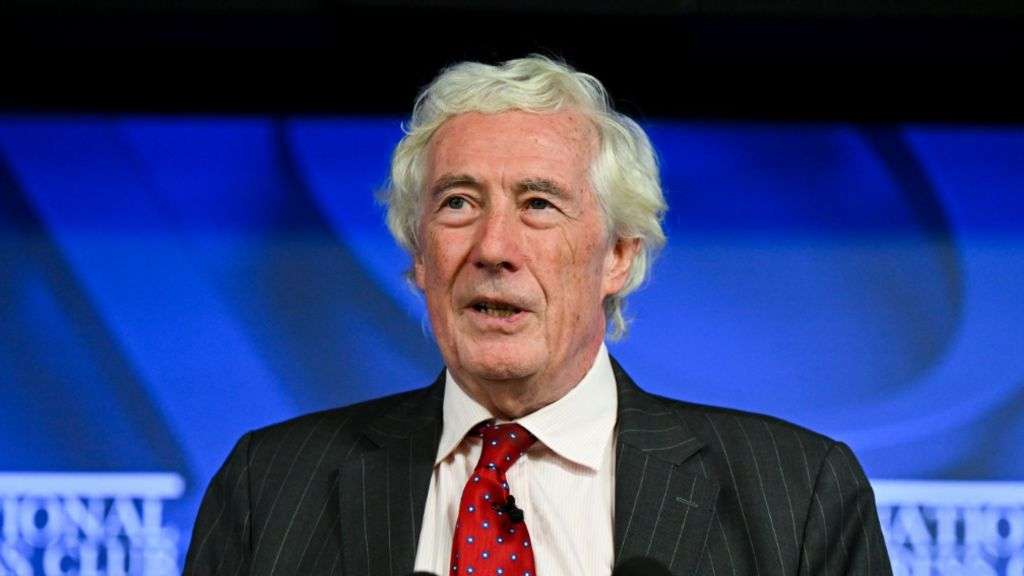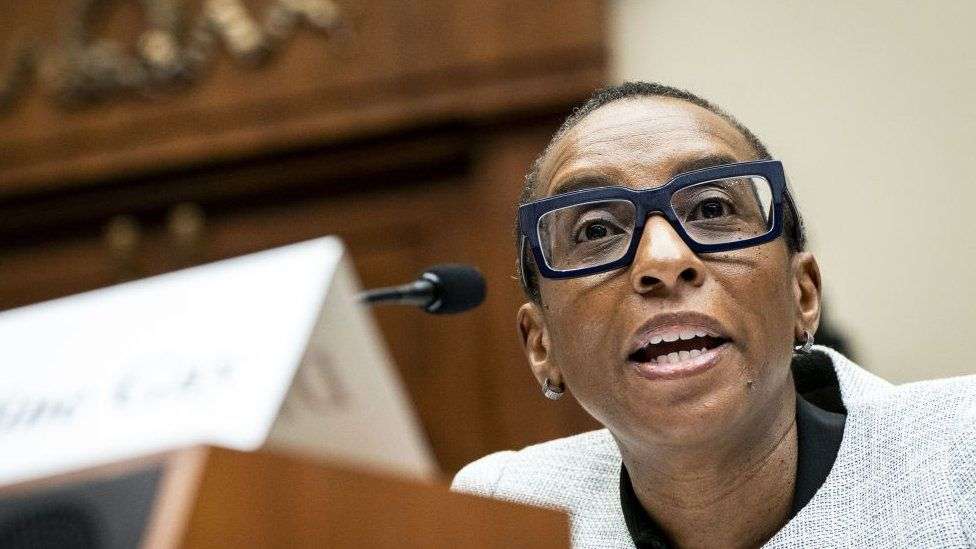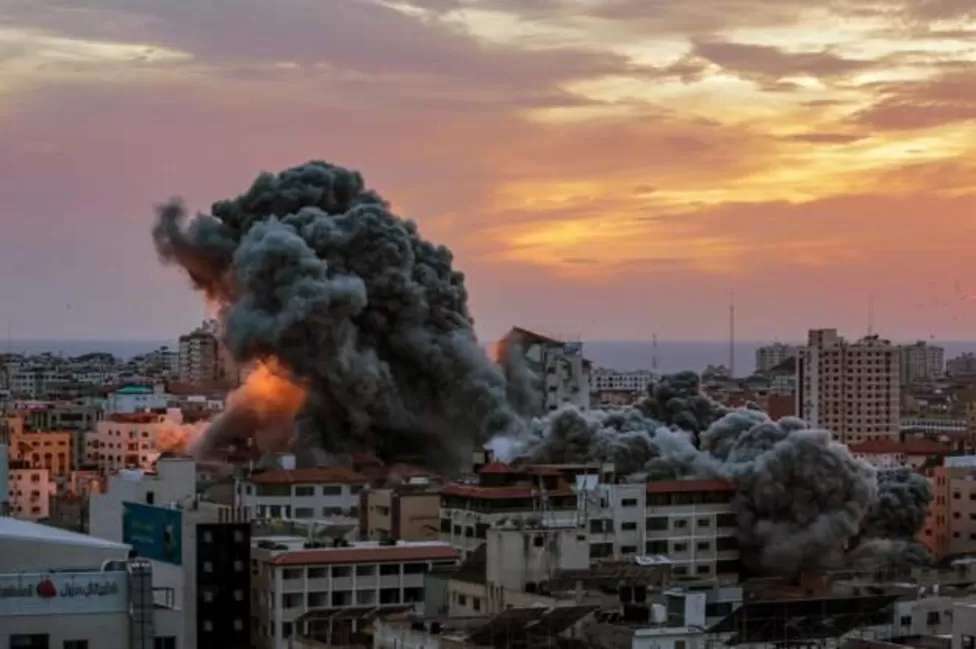Two senior British judges have resigned from Hong Kong’s highest court, with one citing “the political situation” in the city.
The departure of Lords Lawrence Collins and Jonathan Sumption comes a week after a landmark case where 14 democracy activists were convicted of subversion.
The former UK Supreme Court justices were two of 10 overseas judges who sit on the city's Court of Final Appeal - a legacy holdover of Hong Kong's past as a British colony.
Legal experts and Western governments have warned that rule of law is at risk in Hong Kong, after China imposed security laws which critics say silence dissent.
But Hong Kong’s government denies this and claims the city is still a top jurisdiction.
On Thursday, Lord Collins, who had sat on the court since 2012, said he was resigning “because of the political situation in Hong Kong”.
“But I continue to have the fullest confidence in the court and the total independence of its members,” he said in a statement to media.
Lord Sumption did not issue a statement, Reuters news agency reported. The OceanNewsUK has sought comment from both judges.
Their departure follows that of three other high-profile Western judges in recent years.
Hong Kong's leader John Lee expressed regret over the judges' resignations, but highlighted Lord Collins' comments on the remaining judges' independence.
He also defended the city's security laws saying Hong Kong had "transitioned from chaos to order".
"That did not change the human rights and freedoms enjoyed by citizens in accordance with the law. Nor did it change the courts’ exercise of independent judicial power, free from any interference” he said.
How do Hong Kong courts work and why is there concern?
Currently there are eight overseas judges sitting on Hong Kong's top court - from the UK, Australia and Canada.
Typically, a bench for an appeal case would consist of the chief justice, three Hong Kong judges and a foreign judge.
In this role as "non-permanent" appointees, they are paid up to £40,000 according to reports.
The Court of Final Appeal has operated this way since the UK handed the territory back to China in 1997.
It was a considered a bulwark protection to help uphold the British-style common law legal system and Hong Kong's continuation of this elevated its stature as a global financial hub.
International firms had more faith in its legal system than that of mainland China.
But critics say this system has been damaged after Beijing’s crackdown on the city following widespread pro-democracy demonstrations in 2019.
Experts point to the impact of two national security laws (NSL) – the first enacted in 2020 and the second in March – as having overridden rights and freedoms otherwise protected under the city’s constitutional Basic Law.
In the past few years, hundreds of people have been arrested under NSL and been denied legal rights typically afforded to those facing trial.
For example, most NSL defendants in Hong Kong have been denied bail and many have been subjected to lengthy pre-trial detention.
In the Hong Kong 47 case verdict last week, some defendants were held for more than two years before their trial began.
What have other foreign judges done?
In 2020, the year the NSL came in, veteran Australian judge James Spigelman resigned from the Court of Final Appeal citing concerns about the sweeping scope of the law.
Then in 2022, serving UK Supreme Court justices Robert Reed and Patrick Hodge followed suit following concerns raised by the British government.
Lord Reed said he agreed with the government that serving members of the UK’s Supreme Court could not continue to sit on Hong Kong's court without appearing to endorse a government that had “departed from values of political freedom, and freedom of expression”.
Since then the remaining foreign judges have faced growing pressure to recuse themselves, with rights groups and Western governments including the US, UK, EU members and Australia raising concerns about Hong Kong’s legal system.
In 2022, when the sitting UK Supreme Court judges cut ties – the remaining foreign judges on the CFA issued a statement defending their position to remain.
The judges at the time – including Lords Collins and Sumption – said they believed their “continued participation” would be “in the interest of the people of Hong Kong”.
Increasing pressure
Thursday's resignations are just the latest sign of concern among the international legal community.
A 43-page legal opinion issued in 2022 and signed by several senior legal figures - including former UK attorney-general Sir Robert Buckland - warned that the overseas judges in Hong Kong were being used by the government to loan credibility.
It told the judges they were working in a legal environment where judicial independence had been “wholly undermined” and the Chinese government could dictate the outcome of cases.
Alvin Cheung, a former Hong Kong barrister and now legal scholar at Queen's University in Canada has written extensively on the system’s changes post NSL. He told the OceanNewsUK last year he believed the judges were “delusional” for thinking they could have any moderating influence.
He said they could cling to a sense of judicial independence because they are largely not called upon to preside over controversial cases.
“They have a nice little junket for a couple of weeks, they hear a couple of cases and then they’re flown out again,” he said.
But Hong Kong authorities stridently endorse the integrity of its courts.
The Chief Justice of the Hong Kong Court of Final Appeal, Andrew Cheung said, "All judges and judicial officers will continue to... administer justice in full accordance with the law, without fear or favour, self-interest or deceit".
He added that the latest resignations would not affect the functioning of the court.








